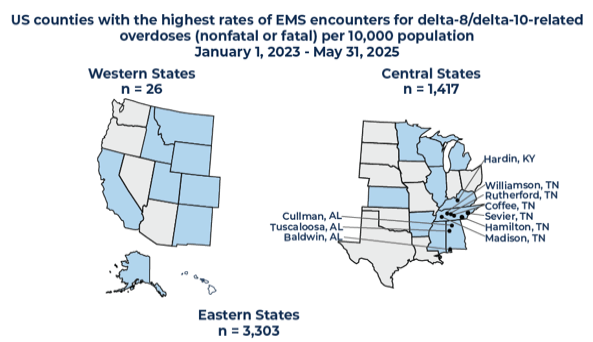
Alert – NDEWS –
The legalization of hemp-derived products in 2018 has led to the emergence of ∆9-tetrahydrocannabinol (∆9-THC) analogs and isomers. These substances are sold in shops and online as a legal alternative to cannabis with minimal regulatory oversight. The Food and Drug Administration and poison centers throughout the US have received numerous reports of semi-synthetic cannabinoid-associated adverse events in patients. Semi-synthetic cannabinoids are sold as smokable, vaping, and ingestible products. ∆8-Tetrahydrocannabinol is the most common isomer of ∆9-THC; and others include ∆10-tetrahydrocannabinol (∆10-THC) and hexahydrocannabinol (HHC).
This week, the Briefing highlights some recent literature on these products as well as our biospatial report on semi-synthetic cannabinoid-related 911 encounters. We will continue to monitor the consequences of use of these drugs. If you have any suggestions, results from your own data collection, or insights on the effects of these substances, let us know. And as always, if you have any ideas for the focus of our future briefings, please reach out.
The NDEWS team is preparing for our annual meeting—the College on Problems of Drug Dependence—which is being held in New Orleans June 14th to 18th with additional talks on the 19th and 20th for those attending the Research Society on Alcohol taking place from the 21st to the 25th of June, also in New Orleans. We look forward to sharing our work with you all in next Friday’s Briefing as well as select presentation findings from attendees.
NDEWS Special Report: US counties with the highest rates of EMS encounters for delta-8/delta-10-related
overdoses (nonfatal or fatal) per 10,000 population
January 1, 2023 – May 31, 2025


Leave a Reply